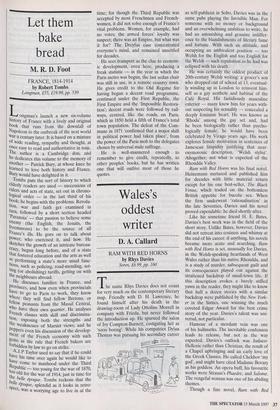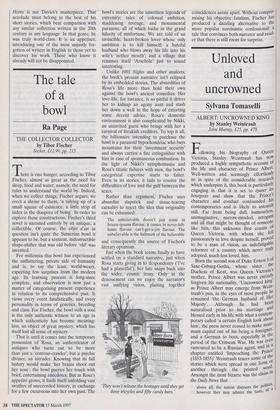Wales's oddest writer
D. A. Callard
RAM WITH RED HORNS by Rhys Davies Seren, £6.99, pp. 160 The name Rhys Davies does not count for very much on the contemporary literary map. Friendly with D. H. Lawrence, he found himself after his death in the drawing-room of Lady Ottoline Morrell in company with Frieda, but never followed the introduction up. He spurned the salon of Ivy Compton-Burnett, castigating her as `s000 boring'. While his compatriot Dylan Thomas was pursuing his secondary career as self-publicist in Soho, Davies was in the same pubs playing the Invisible Man. For someone with no money or background and an overwhelming ambition to write, he had an astonishing and genuine indiffer- ence to the blandishments of literary fame and fortune. With such an attitude, and occupying an ambivalent position — too Welsh for the English and too English for the Welsh — such reputation as he had was eclipsed with his death.
He was certainly the oddest product of 20th-century Welsh writing: a grocer's son who dropped out of school at 13, eventual- ly winding up in London to reinvent him- self as a gay aesthete and habitué of the Café Royal. His fastidiously masculine exterior — many knew him for years with- out suspecting his sexuality — concealed a deeply feminine heart. He was known as `Rhoda' among the gay set and, had he been biologically rather than psycho- logically female, he would have been celebrated by Virago years ago. His work explores female motivation in sentences of Jamesean limpidity justifying that near- oxymoronic description, 'Welsh stylist'. Altogether, not what is expected of the Rhondda Valley.
Ram with Red Horns was his final novel. Heinemann nurtured and published him for decades with little material return except for his one best-seller, The Black Venus, which traded on the bottomless British appetite for bucolic sex. When the firm underwent 'rationalisation' in the late Seventies, Davies and his novel proved expendable: he died shortly after.
Like his sometime friend H. E. Bates, Davies's best work was in the field of the short story. Unlike Bates, however, Davies did not retreat into cosiness and whimsy at the end of his career: if anything, his novels became more acute and searching. Ram with Red Horns is set, unusually for Davies, in the Welsh-speaking heartlands of West Wales rather than his native Rhondda, and is a study of murder, subsequent guilt and its consequences played out against the straitened backdrop of small-town life. If this description evokes a barely stifled yawn in the reader, they might like to know that half a dozen stories with a similar backdrop were published by the New York- er in the Sixties, one winning the much coveted Edgar Award for the best crime story of the year. Davies's talent was uni- versal, not particular.
Humour of a mordant vein was one of his hallmarks. The inevitable confession leads to release, but not in the way expected. Davies's outlook was Judaeo- Hellenic rather than Christian, the result of a Chapel upbringing and an early love of the Greek Classics. He called Chekhov 'my god', and might have cited Madame Bovary as his goddess. An opera buff, his favourite works were Strauss's Phaedre, and Salome. The vengeful woman was one of his abiding themes.
Though a fine novel, Ram with Red Horns is not Davies's masterpiece. That accolade must belong to the best of his short stories, which bear comparison with any similar collection written in the 20th century in any language. In that genre, he was truly world-class. It is an appetiser, introducing one of the most unjustly for- gotten of writers in English to those yet to discover his work. Those who know it already will not be disappointed.



































































 Previous page
Previous page